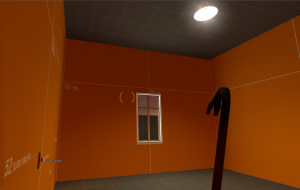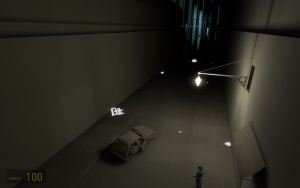Lighting
| Abstract Mapping series Discuss your thoughts - Help us develop the articles or ideas you want |
|---|
|
Ammunition | List of HL2 Animals and Creatures | Mapping with Antlions | Beams and Lasers | Cables and Ropes | Moving Clouds | Color Theory in Level Design | Combat | Combine | Compression (Source 1) | Doors | Dust, Fog, & Smoke | Elevators | Level Transitions | Environmental Lighting, Sun, Weather, & Outdoors | Explosions | Fire | Half-Life 2 Foliage | Glass & Windows | Headcrab | Health | Ladders | Lighting | Optimization (level design) | Physics | Retinal scanners | Sound and Music | Special effects | Terrain | Trains | Turrets | Water | Weapons | Zombie |
Lighting refers to all systems in Source which light up a level to make it look realistic. There are many areas of knowledge about lighting that a source level designer should know, most of which are accessible through this page.
Guides
- Adding Light - A beginners tutorial on how to set up a basic light entity.
- Intermediate Lighting - A tutorial dealing with all the light sources in more detail.
- Advanced Lighting - Additional information about lighting.
- Constant-Linear-Quadratic Falloff - An easy-to-read explanation of the old C-L-Q light attenuation system.
- HDR - High Dynamic Range Lighting.
Types
Static Light Sources
- light
- A static, omni-directional point light source. (e.g. a naked light bulb or flame.)
- light_spot
- A static, uni-directional point light source. (e.g. a torch or flashlight) The conical beam angle cannot exceed 90°.
- light_environment
- Provides two linked light sources:
- A diffuse 'ambient' light (representing reflected light from clouds and the atmosphere in general) that emits from all skybox surfaces
- A directional 'brightness' light (representing sunlight or moonlight) that is only cast in a single direction.
- Both are emitted from the
toolsskyboxandtoolsskybox2dmaterials wherever they are used in a map. See also Skybox. - env_particlelight
- Illuminates particles produced by env_smokestack. Particles are not affected by normal lighting. Use (no more than) two of these to make
env_smokestackparticles appear to reflect ambient lighting. - light_directional (in all games since
 )(also in
)(also in  )
) - Essentially a second (or third, or…) one of the direct light from
light_environment. Likelight_environment's direct light, it is emitted only from brush faces textured withtoolsskybox. Unlikelight_environment, it can be toggled or use lightstyles without significant bugs. - Glowing Textures
- Any brush surfaces with a light-emitting material (as defined in a RAD file, either the one in your mod directory or the one in
sourcesdk/bin/) applied will cast volumetric light in a 180° cone.
Static Light Receivers
- Brushes
- The "Lightmap Scale" tool in the Hammer Face Edit Dialog can be used to control how sharp or diffuse the lightmap of a brush surface will be—an effect most noticeable between areas of high contrast, e.g. shadows. Note that, while adding extra light sources will not significantly affect performance, decreasing lightmap scale (i.e., increasing resolution) will more directly increase map file size and memory usage.
- prop_static
- Unlike other model entities,
prop_statics are lit statically: a lighting value is stored for every vertex, and the model's collision mesh (or, optionally, reference mesh) is used to calculate lightmap shadows. - There are the following options:
disableshadows- Do not cast lightmap shadowsdisablevertexlighting- Only store a single lighting value for the entire modeldisableselfshadowing- Prevents the entity from casting shadows on itselfignorenormals- Ignores normals of vertex data to calculate lighting. This is extremely useful for foliage and other thin types of vertex meshes.generatelightmaps(only in

 ) - Allows the props to use lightmaps (like world brushes) if VRAD is run with
) - Allows the props to use lightmaps (like world brushes) if VRAD is run with -StaticPropLightingand the prop is not bumpmapped. Lightmap resolution can be configured withlightmapresolutionxandlightmapresolutiony. (only in gmod) Can also be manually defined with the $lightmap shader parameter, including on non-static props.
 Warning:There are a number of caveats related to lighting on prop_static. See its page for detailed info.
Warning:There are a number of caveats related to lighting on prop_static. See its page for detailed info.- All non-internal brush entities (in all games since
 )
) - Use the
vrad_brush_cast_shadowskeyvalue to allow them to cast lightmap shadows. Might be !FGD in some games and/or on some entities.
Dynamic Light Sources
- light_dynamic
- A simple, uni-directional dynamic light that can be moved, turned, and adjusted.
- point_spotlight
- A dynamic spotlight beam effect, with an optional dynamic light source where it hits a surface.
- npc_spotlight
- A spotlight NPC, similar to
point_spotlight, but with the capability of tracking targets. - env_projectedtexture
- A dynamic light that lights with a texture rather than a solid color and "subtracts" realistic dynamic shadows. Affects all surfaces that can accept lighting, and is used for the player's flashlight in
 Half-Life 2: Episode Two.
Half-Life 2: Episode Two.
- In games since
 Portal 2, most visible dynamic entities can have texture projection disabled with the
Portal 2, most visible dynamic entities can have texture projection disabled with the disableflashlightkeyvalue, and they can have it toggled at runtime with the EnableReceivingFlashlight and DisableReceivingFlashlight inputs. Their shadow-casting behavior, however, must be controlled separately (see under Dynamic Shadows). In earlier games, this behavior can still be controlled via theEF_NOFLASHLIGHTeffect flag (see below).
- In games since
- Effect flags !FGD
- Most entities with an origin KV can have EF_BRIGHTLIGHT or EF_DIMLIGHT applied to them to have them radiate dynamic light of the appropriate brightness.
Dynamic Shadows
info_no_dynamic_shadow to get around this problem if you encounter it. CSM does not have this issue.env_projectedtexture-based effects).- shadow_control
- Point entity used to control Dynamic shadow projections for the entire map, including maximum distance cast, direction cast, and sharpness/diffuseness.
- env_cascade_light
- Point entity used to control Dynamic shadow projections casted via the
tools/toolsskyboxtexture. Uses Cascade Shadow Map technique. (only in
 )
) - info_no_dynamic_shadow
- Point entity used to list brush surfaces that should not receive Dynamic shadows.
- Most dynamic visible entities
- Have a
shadowcastdistkeyvalue to override how far these objects cast Dynamic shadows, adisableshadowskeyvalue to control whether they cast Dynamic shadows, and EnableShadow and DisableShadow inputs to control Dynamic shadows cast by them. In games since Portal 2, they also have
Portal 2, they also have disableshadowdepthto prevent them casting shadows fromenv_projectedtexture. - Effect flags !FGD
- Most entities can have various effect flags applied to them to regulate many of the same effects as the aforementioned keyvalues, even if they don't have those keyvalues in your version of Source.
Tyndall Effects
Tyndall effects are caused by light scattering on suspended (colloid) particles in a transparent medium. E.g., car headlights in fog.
- Halo (Glow Sprite) effects :
- env_sprite - entity used to create omni-directional glow or flare effects.
- env_lightglow - an asymmetrical glow (for areas of contrasting light).
- env_sun - adds a bright haloed spot to the Skybox to represent the position of the Sun or Moon.
- Lightbeam (Volumetric Light) effects :
- Brush texture :
models/effects/vol_light001 - Brush texture :
models/effects/vol_light002 - Model :
models/Effects/vol_light.mdl- use with prop_static.
- Brush texture :
- See also Render Modes for sprites, particularly World Space Glow.
Common Values
| Brightness | |
|---|---|
| Car Headlights | 231 223 192 |
| Combine lamp | 147 226 240 |
| Tungsten bulb | 254 216 146 |
| Fire | 254 174 10 |
| Fluorescent tube (cold) | 159 237 215 |
| Flourescent tube (warm) | 255 245 145 |
For values to accompany the stock skybox materials, see Sky List.
Notes
- Naming a static light makes it more expensive. Only name lights when you need to. Multiple lights sharing the same name are cheaper than lights with separate names.
- light_dynamic is especially expensive and will not even show up on some systems
- The basic light entities do not come with a visible representation (e.g. a lightbulb). For that, you need a prop. See HL2 Light Props for a list.
- The basic light entities do not come with a "glow" as you'd expect to see in a foggy or misty area. To provide this, either compile and run the map with HDR enabled, or add a point_spotlight (with dynamic lighting off unless needed), env_lightglow, or env_sprite entity.
- Maps will not be lit unless you run VRAD (or equivalent). VRAD will not run properly and will not calculate realistic light bounces unless the level is free of leaks.
- Moving brushed-based objects will not change the way they are lit. Their lighting will be calculated only according to their positions in Hammer. (e.g. a brush in a dark room will not become bright if it is brought into a bright room.)
- Light can be reflected off surfaces during compile, indirectly illuminating the environment around them. See $reflectivity.
Console Commands
mat_fullbright <0-2>0is normal lighting.1is 'full bright' lighting, where everything is 100% lit. This will be enabled by default if there's no lighting data on the map (BSP), or the map was compiled for HDR lighting only and HDR is disabled.2has been introduced with the Orange Box and is 'lighting only'. It replaces all$basetextures with a colorless monotone, allowing you to see exactly what is lit, where, and probably how. Ignored for materials with$no_fullbright.
mat_toolsvis replaced mat_fullbright in See also
- HL2 Light Props
- Color theory (level design)
- Light entities - A list of light entities.
- Intermediate Lighting
- Advanced Lighting
- Window lighting - How to simulate refracted sunlight through openings.
- Light editor
External links
- Understanding and Using Lightmaps (Archived version retrieved on 26 August, 2007)
- Volumetric Lighting (Archived version retrieved on 24 August, 2007)
- Lighting Tutorial - Covers entities & variables with examples (Archived version retrieved on 6 September, 2016)
- Quadratic/Linear/Constant in Lights (Archived version retrieved on 24 November, 2010)
- HDR/Shaped Light/Burning Light/Darkness/Sun/Volumetric (Archived version retrieved on 20 January, 2008)


